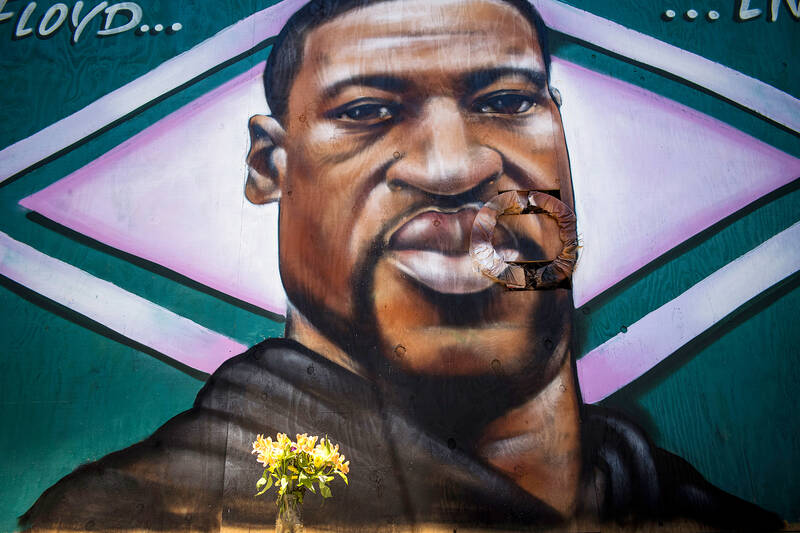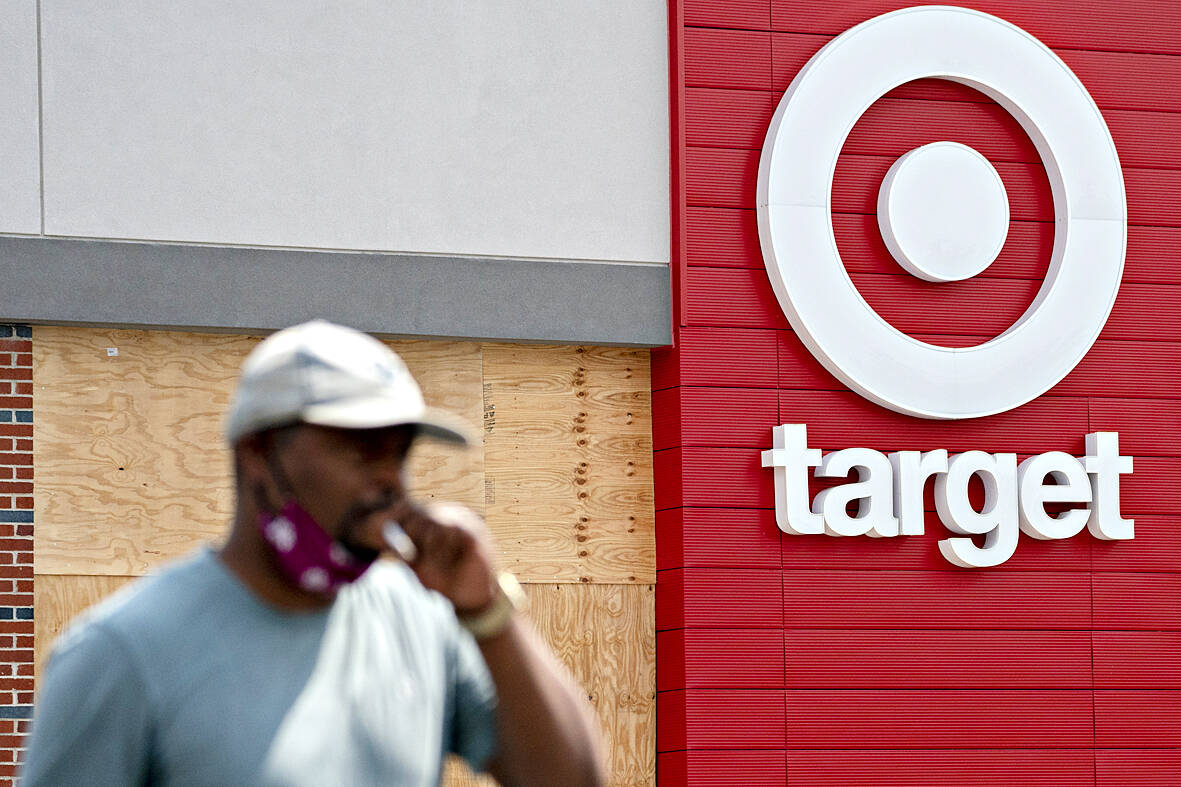When Jerome Eisenberg enrolled his daughter at the Brentwood School in Los Angeles, where Adam Levine met some of his Maroon 5 bandmates, the investment manager says he expected her to get a traditional liberal arts education.
But after the murder of George Floyd, the US$50,000-a-year school said it was reimagining its purpose “with an eye toward anti-racism” and diversity, equity and inclusion, or DEI. In Eisenberg’s view, Brentwood was pulling a “bait and switch” on parents. He sued the school last year for breach of contract, civil rights violations and emotional distress.
“The curriculum change shifted away from teaching students critical thinking skills — how to think — and started indoctrinating them into what to think, based on Brentwood’s preferred political fad of the moment,” Eisenberg said in his lawsuit.

Photo: Bloomberg
Brentwood succeeded in having the suit sent to private arbitration in November. A representative of the school declined to comment.
WAR ON ‘WOKE’
Republican politicians like Florida Governor Ron DeSantis have pushed laws to curtail instruction in gender, sexuality and racial identity in public schools. Private schools aren’t subject to those laws, but that doesn’t mean they’re immune to the culture war. Conservative-leaning parents have voiced opposition in other ways, including by filing lawsuits.

Photo: Bloomberg
“There is an increased appetite for parents using the legal process to fight for their kids in a way that just wasn’t as prevalent before,” said Sara Goldsmith Schwartz, of Andover, Massachusetts-based Schwartz Hannum PC, who frequently represents private schools.
David Pivtorak, a lawyer for Eisenberg, also said he believes legal complaints against private schools over DEI have increased, though he added that the true number may be understated because of arbitration clauses like the one at Brentwood.
Others see a distortion. Jin Hee Lee, director of strategic initiatives at the NAACP’s Legal Defense Fund, said the pitched legal and political battles are painting a “misleading” picture about opposition to DEI instruction.
“The majority of parents want their children to attend a school that is diverse and inclusive,” Lee said, “and the majority of Americans understand that we have a very tragic legacy of slavery and Jim Crow and racial subjugation that we’re still dealing with in this country.”
BREACH OF CONTRACT
Parents determined to challenge private school teaching and policies face a number of obstacles. Public school parents can argue that the government is infringing on their First Amendment rights by forcing DEI or similar instruction on their children. Parents largely waive those rights when they enroll their kids in private schools.
“Private schools are bound by their own policies and not the US Constitution,” said Jennifer Rippner, a law lecturer at Indiana University, Bloomington’s School of Education.
When parents do sue private schools, it’s usually for breach of contract, according to New Hampshire education lawyer Linda Johnson, who represents independent schools and consults with them on managing their legal risk. The process sometimes starts off with “a 10-page, single-space letter addressing everything that the parent thought the school did wrong to try to justify a repayment of tuition,” she said.
Many of the disputes arise out of school disciplinary action, Johnson said. In the current environment, that can have political overtones.
Manhattan’s US$60,000-a-year Spence School, Gwyneth Paltrow’s alma mater, was sued in 2019 by Adam and Michelle Parker after their daughter was disciplined for posting on Instagram a text exchange in which she and some friends joked about dressing up as enslaved and indigenous people for Halloween.
Her punishment was a half day of “in-home reflection,” and the school had multiple grade-wide assemblies to go over what she had done, according to the Parkers’ lawsuit.
‘FALSE NARRATIVE’
The Parkers say their daughter was mocking, not exhibiting, racism. They allege that Spence disciplined the girl before even seeing the post and perpetuated a “false narrative” after they saw it. According to the suit, the school admitted to the Parkers that it “had gotten it wrong” and that Spence failed to convene a “community standards committee” as stipulated in their enrollment contract.
The suit was dismissed in 2020. Then, last year, a New York appeals court revived a breach-of-contract claim, keeping out allegations of slander, libel and emotional distress.
A lawyer for Spence declined to comment, and lawyers for the Parkers didn’t respond to requests for comment.
Johnson said suits focused narrowly on unequal or arbitrary discipline can succeed. If the handbook lays out guidelines for infractions but doesn’t have a disclaimer that “we maintain the flexibility to handle them the way we think is necessary under the circumstances,” the school may be legally exposed, she said.
When it comes to parents challenging private school curricula they see as misguided, Steven Ludwig, a Philadelphia-based education lawyer, said he doesn’t see a viable legal path. After all, the parents made the decision to send their children to that school.
“If a person doesn’t like what is being taught, they can go somewhere else,” Ludwig said.
WHERE TO GO?
That’s not always so easy. Private schools that have embraced DEI are frequently also those with the strongest academic reputations and the best records of placing graduates in Ivy League and other elite colleges — which themselves have been criticized as bastions of wokeness. Senator Ted Cruz of Texas, a noted anti-DEI crusader, was called out for hypocrisy when it emerged that he sent his daughters to a Houston prep school that teaches DEI.
Former investment banker Andrew Gutmann caused a stir two years ago when he wrote a letter to other parents at Manhattan’s Brearley School urging them to reject Brearley’s “obsession with race” and saying he was pulling his daughter, Lauren, from the top-ranked school, where tuition is about US$60,000.
Brearley head Jane Fried shot out an e-mail calling the letter “deeply offensive and harmful” and reaffirming the school’s commitment to being “inclusive” and “antiracist.”
Gutmann said in an interview that his family wasn’t “looking for a conservative education.” He said they “just want what anybody would’ve used to call a traditional liberal arts education.”
A representative of Brearley didn’t respond to a request for comment.
‘PARENTS’ MOVEMENT’
Since withdrawing Lauren from Brearley, Gutmann said, it has been “nearly impossible” to find a school that challenges his daughter academically but isn’t “politicized.” He tried a small private school in New Jersey and then another in Florida before opting to home-school her this year. He plans to send her to a British boarding school in the fall.
Gutmann clearly has no regrets. Now living in Boca Raton, Florida, he is even running for Congress on the issue, as a Republican in Florida’s 22nd congressional district — which, he notes, includes Donald Trump’s Mar-a-Lago estate. His primary campaign announcement starts by recounting his letter to Brearley.
“My words were read by millions of people across America, and they helped ignite what we now call the parents’ movement and the fight against woke education,” Gutmann said in the announcement. He name-checked other groups he said he was proud to call allies, including Moms for Liberty. The Florida-based parents’ rights group has been at the forefront of efforts to ban certain books and gain control of school boards for conservatives.
‘AWAKE TO FAILURE’
“We have a nation that’s awake now to the rampant educational failure that’s happening in our schools, and the fact that they’ve become indoctrination centers instead of places of learning,” said Moms for Liberty co-founder Tiffany Justice.
Lee of the NAACP’s Legal Defense Fund thinks the opposite is true.
“It’s not as if school districts and private schools are necessarily doing all they should be doing when it comes to race equity or having a more inclusive or representative curriculum,” she said. “There’s actually more that they should be doing, but what little they are doing is now under attack.”
Although the efforts of Justice and other conservative activists focus on public schools, Myra McGovern, a spokesperson for the National Association of Independent Schools — which counts Brentwood, Spence, Brearley and the Dalton School among its members — said private schools can’t help but be affected as well.
“Every school across America, and in many ways around the world, is dealing with this increased polarization,” McGovern said.
In her Massachusetts law practice, Schwartz sees that too. Short of lawsuits, private schools have had to deal with “an incredible increase in the intensity, velocity and volume of complaints generally, from students, parents and alums,” she said. “The world is frazzled.”

In recent weeks the Trump Administration has been demanding that Taiwan transfer half of its chip manufacturing to the US. In an interview with NewsNation, US Secretary of Commerce Howard Lutnick said that the US would need 50 percent of domestic chip production to protect Taiwan. He stated, discussing Taiwan’s chip production: “My argument to them was, well, if you have 95 percent, how am I gonna get it to protect you? You’re going to put it on a plane? You’re going to put it on a boat?” The stench of the Trump Administration’s mafia-style notions of “protection” was strong

Every now and then, it’s nice to just point somewhere on a map and head out with no plan. In Taiwan, where convenience reigns, food options are plentiful and people are generally friendly and helpful, this type of trip is that much easier to pull off. One day last November, a spur-of-the-moment day hike in the hills of Chiayi County turned into a surprisingly memorable experience that impressed on me once again how fortunate we all are to call this island home. The scenery I walked through that day — a mix of forest and farms reaching up into the clouds

With one week left until election day, the drama is high in the race for the Chinese Nationalist Party (KMT) chair. The race is still potentially wide open between the three frontrunners. The most accurate poll is done by Apollo Survey & Research Co (艾普羅民調公司), which was conducted a week and a half ago with two-thirds of the respondents party members, who are the only ones eligible to vote. For details on the candidates, check the Oct. 4 edition of this column, “A look at the KMT chair candidates” on page 12. The popular frontrunner was 56-year-old Cheng Li-wun (鄭麗文)

Oct. 13 to Oct. 19 When ordered to resign from her teaching position in June 1928 due to her husband’s anti-colonial activities, Lin Shih-hao (林氏好) refused to back down. The next day, she still showed up at Tainan Second Preschool, where she was warned that she would be fired if she didn’t comply. Lin continued to ignore the orders and was eventually let go without severance — even losing her pay for that month. Rather than despairing, she found a non-government job and even joined her husband Lu Ping-ting’s (盧丙丁) non-violent resistance and labor rights movements. When the government’s 1931 crackdown